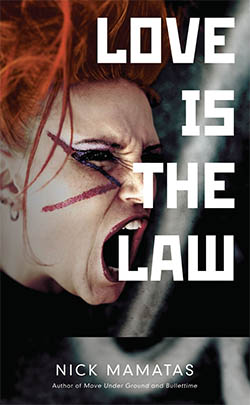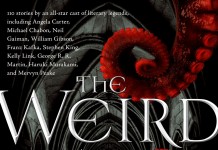 Author, teacher of writing, anthologist, jokester, sometime radical, father-of-adorable-infant and allround nihilistic kid Nick Mamatas has written across genres and voices with wit, zip, and flair through “six and a half novels” and a slew of shorter works. He was even partly responsible for bringing Edge of Tomorrow to our screens by adapting the Japanese original of the story, All You Need Is Kill, into graphic novel form. Love Is the Law is his foray into something like neo-noir or crime fiction, but definitely with a genre-spinning twist that loops in occultism and some urban fantasy as well as far-left politics and gritty recent-historical fiction.
Author, teacher of writing, anthologist, jokester, sometime radical, father-of-adorable-infant and allround nihilistic kid Nick Mamatas has written across genres and voices with wit, zip, and flair through “six and a half novels” and a slew of shorter works. He was even partly responsible for bringing Edge of Tomorrow to our screens by adapting the Japanese original of the story, All You Need Is Kill, into graphic novel form. Love Is the Law is his foray into something like neo-noir or crime fiction, but definitely with a genre-spinning twist that loops in occultism and some urban fantasy as well as far-left politics and gritty recent-historical fiction.
It’s 1989, and “Golden” Dawn Seigler, Long Island punk chick and devotee of Marxism, magick, and masochism, among other social vices, is out to unearth the truth behind the death of her (much older) mentor and fellatee Bernstein, himself a Marxist magus and a man of many mysterious connections, found with a bullet in his brain from a gun held in the wrong hand. She dives in to the morass of Long Island fringe society in her hunt, armed only with a freight of precocious Communism and Crowleyanity, and a barbed tongue (as well as a barbed ring). You can read more about the genesis of the novel in an interview here.
So Love Is the Law is a murder mystery, of sorts, and people do get done to death, in unexpected ways and for unexpected reasons, but there is a whole lot more going on here (including some very good writing). It mixes a great many themes and references deftly, without any of them overpowering the narrative. It’s very much an Eighties novel, but not remotely the big-hair-and-shoulder-pads Eighties that you still see in retro horror movie screenings (or at least, you do if you’re me). Dawn doesn’t feel remotely dated as a protagonist, not least because her Marxism gives her a different spin on the events of 1989 and because Mamatas can drop in numerous sly allusions about how things will evolve – or devolve – later. The prose and the pace is taut, edgy, and lean, with only the occasional longeur when Dawn’s inner monologue grows a little too dense and clotted. She may not always be the most likeable protagonist, but she’s not going to try anyone’s patience, not least with her style of repartee. Nor is such a brief but fast-paced novel going to outstay anyone’s welcome. And things do not end well – but in a noirish novel set in the Eighties, what else do you expect? Recommended.


































